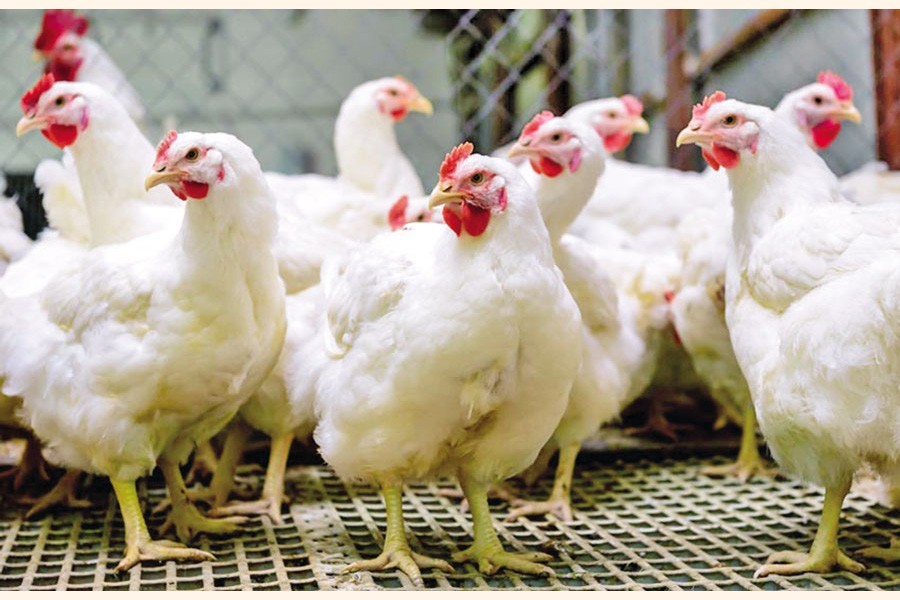
Published :
Updated :

Export of Bangladeshi poultry products is facing multiple challenges, as the government is yet to offer necessary policies and regulations for properly expanding the potential foreign exchange earning sector, insiders said on Saturday.
Local businesses have started export of poultry products to some destinations. But, several obstacles, including those related with certification, regulations, and fiscal measures, are hampering their potential shipments, they added.
Industry sources said the country's poultry export started in 2019 with shipments of poultry and fish feeds to Indian and Nepalese markets.
Some five to six companies, including Paragon, NOURISH, CP Bangladesh, Aftab Bahumukhi Farm Limited, and AG Foods, have begun their overseas shipments since then.
Abu Lutfe Fazle Rahman, the owner of Aftab Bahumukhi Farm Ltd - a leading company of poultry sector, told the FE that Bangladesh needs compartmentalization or specific zoning for poultry productions.
"The government needs to allocate some special areas or zones in the country for poultry production. It has to be ensured that those zones remain disease-free. Then the importers will be convinced to take Bangladeshi products."
Mr Rahman also said there are also some potentials of exporting poultry by-products, like chicken feet, blood and feather, to China and other overseas markets.
"But as we do not have specific slaughtering areas, we cannot collect those by-products by maintaining proper hygiene and bio-safety. It is a big obstacle for export. So, the government has to provide this facility in the local markets."
The government also needs to come forward with some fiscal incentives to facilitate poultry exports, he added.
Ihtesham B Shahjahan, President of the Feed Industries Association of Bangladesh (FIAB), told the FE that they have long been facing policy-related, regulatory and fiscal hurdles in shipment of poultry products to overseas countries.
"It is unfortunate that we do not have any poultry export policy, although we are pressing for it for several years. Lack of policy is a big obstacle to our potential export."
He also said: "Another big issue is a bird flu-free chicken production zone certification from the government. If the country is not declared as a flu-free nation, it is very difficult to convince our potential importers."
The exporters need to get certification from some international firms when they go for shipments abroad, he noted.
Meanwhile, the government officials said they were working to prepare a guideline and amend the existing poultry policy to facilitate export.
Besides, the government also has a plan to declare some areas as poultry industrial zones for ensuring bio-security and establishing world standard production facilities, they added.
Dr A B M Khaleduzzaman, Assistant Director of the Department of Livestock Services (DLS), said: "We are preparing a guideline for the local industry to fulfill protocols of the World Organisation for Animal Health (OIE). It will help the local industry to get international certificates for export."
"We will also bring compartmentalization system in different areas of the country, where poultry industries will get special focus to continue their production by maintaining international practices and increase export," he mentioned.
Some local poultry industry owners said they have already introduced the international standard production system for grabbing global poultry feed, meat and egg export markets.
Shamsul Arefin Khaled, Director of leading poultry industry NOURISH, said they have set up international standard poultry feed mills; meat, egg, and day-old chicks (DOC) production units; and processed food unit, eying the global export market.
"We have already got the HACCP (Hazard Analysis and Critical Control Points) and some other good management practice certificates, which will help us to take our produces to the international market," he added.
Mashiur Rahman, President of Bangladesh Poultry Industries Central Council (BPICC), said they have long been trying to maintain the good management practices in their poultry feeds, meat and egg production units, targeting not only the local market but also the overseas markets.
"Halal foods are now very popular across the globe, including in Malaysia, and middle-eastern nations. Bangladesh's poultry producers are trying to enter those markets, and many of them are working to get the Halal certificates."
If the government comes forward with some policy- and tax-related supports, the local industry will be able to be competitive for exporting its produces to the world market, he told the FE.
Industry insiders claimed that the size of the country's poultry industry is nearly Tk 250 billion. The contribution of the poultry sector to the country's gross domestic product (GDP) is nearly 2.4 per cent.
According to the BPICC 2015 data, the local industry could produce nearly 7.12 billion pieces of eggs, 574,629 tonnes of meat, 2.9 million tonnes of feed, and Tk 33.30 billion worth of medicine annually.


 For all latest news, follow The Financial Express Google News channel.
For all latest news, follow The Financial Express Google News channel.